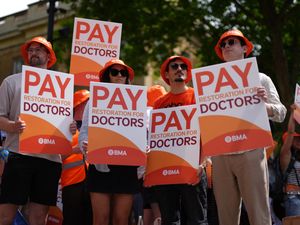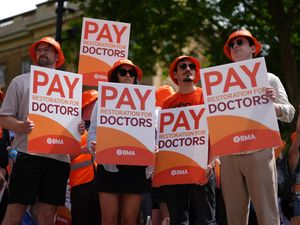Hospitals in crisis: Top doctors across the region plead with Theresa May for more investment and beds
Doctors at hospitals in the Black Country and Staffordshire have raised 'very serious concerns' over the safety of patients in a letter to the Prime Minister calling for an urgent increase in funding and beds.
The leaked document sent to Theresa May by emergency consultants claim hospitals are in crisis due to the failure of front line plans to deal with the current winter pressures.
They describe the compromise of safety at hospitals as 'intolerable' and the NHS as 'severely and chronically underfunding', while also publicly apologising to patients for failing to 'fulfil our pledge for a safe efficient service'.
Among those to have signed the letter are Ruchi Joshi, A&E GP at Walsall Healthcare NHS Trust, Ann-Marie Morris, consultant in emergency medicine at the University Hospitals of North Midlands, and Jo Taylor, from the Dudley Group NHS Foundation Trust.
It has been sent to Downing Street as the latest A&E waiting times figures show a further drop in performance at the region's hospitals in December.
University of Hospitals of North Midlands NHS Trust was among the worst for hospital trusts in the country for the percentage of patients seen within four hours - 71.5 per cent - over the month.
On the last weekend of 2017, trust senior consultant Richard Fawcett described the conditions at A&E as 'Third World' conditions, reporting to have turned up for work to find a 12-hour wait to be seen in A&E with more than 25 patients 'on the corridor'.
The Government target is for 95 per cent of patients to be seen within four hours.
This month, New Cross Hospital, Walsall Manor Hospital, Sandwell General Hospital, Russells Hall Hospital and County Hospital were all ordered to cancel operations in a bid to free up beds and medical staff.
This is despite a winter plan set in place at each trust and extra funding, worth £437m, provided by the Government nationwide for the period.
The letter in full
Dear Prime Minister,
We are writing to you as Consultants in Emergency Medicine, Fellows of the Royal College of Emergency Medicine and as Clinical Leads (Consultants in charge) of our Emergency Departments, representing 68 Acute Hospitals across England and Wales.
We note your recent apology to patients and thanks for how hard we and other NHS staff are working.
We feel compelled to speak out in support of our hardworking and dedicated nursing, medical and allied health professional colleagues and for the very serious concerns we have for the safety of our patients.
This current level of safety compromise is at times intolerable, despite the best efforts of staff.
It has been stated that the NHS was better prepared for this winter than ever before.
Chronically underfunded
There is no question that a huge amount of effort and energy has been spent both locally and nationally on drawing up plans for coping with NHS winter pressures.
Our experience at the front line is that these plans have failed to deliver anywhere near what was needed.
We acknowledge that our Trusts and local CCGs are doing everything they can to create capacity and more beds in the short term, and we are grateful to them for their continued assistance in such a time of crisis.
We also acknowledge the help and support given to the Emergency Departments by our colleagues in other specialties and disciplines across our hospitals.
The facts remain however that the NHS is severely and chronically underfunded.
We have insufficient hospital and community beds and staff of all disciplines especially at the front door to cope with our ageing population’s health needs.
As you will know a number of scientific publications have shown that crowded Emergency Departments are dangerous for patients.
The longer that the patients stay in ED after their treatment has been completed, the greater is their morbidity and associated mortality.
Hospitals lack adequate space
Recent media coverage has reported numerous anecdotal accounts of how appalling the situation in an increasing number of our Emergency Departments has become. These departments are not outliers. Many of the trusts we work in are in similar positions.
Last week’s 4 hour performance target was between 45 and 75%.
Thousands of patients are waiting in ambulances for hours as the hospitals lack adequate space.
Some of our own personal experiences range from
Over 120 patients a day managed in corridors, some dying prematurely
An average of 10-12 hours from decision to admit a patient until they are transferred to a bed
Over 50 patients at a time waiting beds in the Emergency Department
Patients sleeping in clinics as makeshift wards
We have known for a number of years that recruitment of staff to Emergency Departments has been challenging.
Reduce crowding
The recent collaboration between the Royal College of Emergency Medicine and NHS England, Health Education England and NHS Improvement will provide a medium term solution to grow our clinical workforce as well as decrease the attrition rate.
So as a matter of urgency we ask that you consider supporting strategies that will reduce crowding in our Emergency Departments.
These include;
A significant increase in Social Care Funding to allow patients who are fit to be discharged from acute beds to be cared for in the community.
A review of the number of hospital beds that are available for acute care. A number of independent organisations have confirmed that the UK has an inadequate acute bed base to meet the needs of its population.
Prioritisation to implement the workforce strategy that has been agreed between the Royal College and the relevant arms length bodies.
In the meantime we would like to apologise to our patients for being unable to fulfil our pledge for a safe efficient service and acknowledge the hard work and dedication of the staff.
You will understand with the public interest in this matter that we have released this letter to the press also.
We remain hopeful and committed to improving the care of patients in Emergency Departments throughout the UK.
“The NHS belongs to the people….it touches our lives at times of basic human need when care and compassion are what matter most”
The NHS Constitution, 1948.



